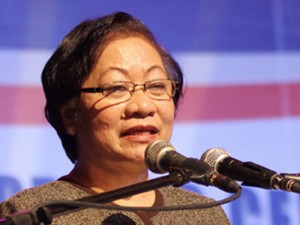DOLE chief allays fears over Singapore foreign worker policy
MANILA, Philippines—Labor Secretary Rosalinda Baldoz on Wednesday allayed fears that Filipino workers would no longer be welcome in Singapore after the city-state imposed limits on foreign workers.
Baldoz said despite the new restrictions on foreign workers in Singapore, its business community continues to favor employing foreign workers likes overseas Filipino workers.
“The Singapore government has amended its Employment of Foreign Manpower Act (EFMA) in July 2012 restricting the entry of foreign workers due to a policy shift. But this does not mean foreigners will no longer be permitted into Singapore to work,” Baldoz said in a statement.
“On the contrary, the Singapore business sector has made its position known favoring the employment of more foreign workers, notwithstanding the restrictive policies of the Singapore government,” she added.
Baldoz said Filipino workers who want to find jobs in Singapore must also understand that the new policy of the country applies to all foreign workers and not just against Filipinos.
“I believe our OFWs have established themselves in niche markets that cannot readily be replaced,” Baldoz said.
“Be that as it may, we at the DOLE are prepared with our reintegration programs for the few OFWs who may be affected by the foreign worker reduction policy,” she added.
Baldoz said she received a report from Philippine Labor Attache to Singapore Vicente Cabe, who noted that the island-state’s government released a population ‘white paper’ in January admitting that Singapore will continue to need a significant number of foreign workers to complement the Singaporean core in its workforce.
The paper hastened to add, however, that it cannot allow an unlimited number of foreign workers to overwhelm the total population, Baldoz said.
She said the “white paper” projected that the entry of foreign workers will slow down, but made it clear that certain groups of workers will continue to be filled up by foreigners.
They include health-care and elder-care workers because of Singapore’s aging population; foreigners doing routine and low-skilled jobs in construction, retail, and food services; and highly-skilled and professionals with cutting-edge skills and abilities, Baldoz said.
“As of 1 July 2012, the Ministry of Manpower has reduced the dependency ratio ceilings (DRCs), which is the percentage of foreign workers allowed in a particular company, in varying degrees depending on the sector concerned,” Cabe said.
He said that in the services sector, the DRC was reduced from 50 percent to 45 percent, while in the manufacturing sector, the DRC was reduced from 65 percent to 60 percent.
He further said the issuance of work passes was divided into three categories: work permits for workers belonging to the low and semi-skilled categories with a salary below SG$2,000; S-passes for mid-level skilled workers with a salary of at least SG$2,000; and professionals and managerial workers under employment pass (E-pass) whose salaries are at least SG$3,000 and above with sub-categories under this group.
In the S-pass category, the sub-DRC for all sectors has been reduced from 25 percent to 20 percent, Cabe said.
The Department of Labor and Employment said Singapore’s foreign manpower quota reduction was a reversal of the policy announced in 2011 about the country’s need to hire foreign workers to support the growth targets of the manufacturing and services sectors and to sustain overall economic growth.
“At that time, it was estimated that some 100,000 foreign workers may be needed to augment the demand for more workers,” DOLE said.
“However, political developments in the country brought about by the elections in 2012 caused the policy shift in the entry of foreign workers because of the complaints of Singapore workers,” it added.
DOLE said Singapore’s Ministry of Manpower has required employers of foreign workers to pay a monthly levy, which has been increased, to discourage employers from hiring foreign workers.
It added that the levy was seen as a way to “equalize or make it more expensive to employ foreign workers whose salaries are lower compared to local workers whose salaries are generally higher.”















